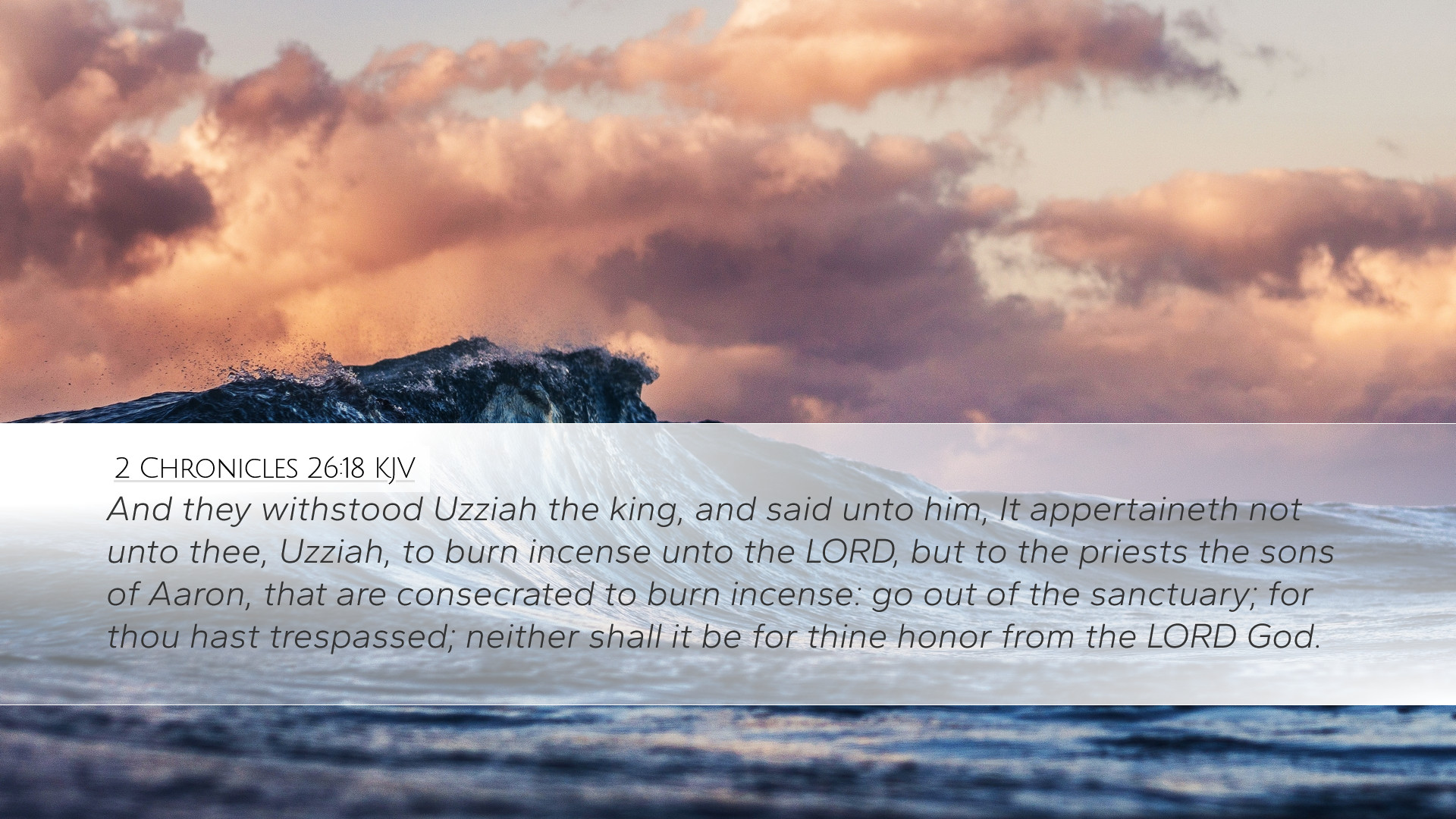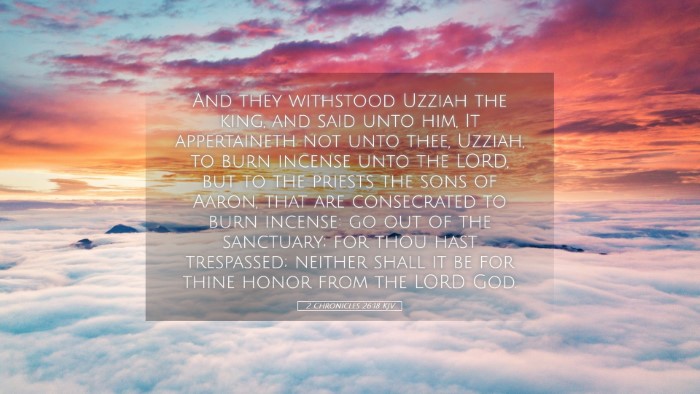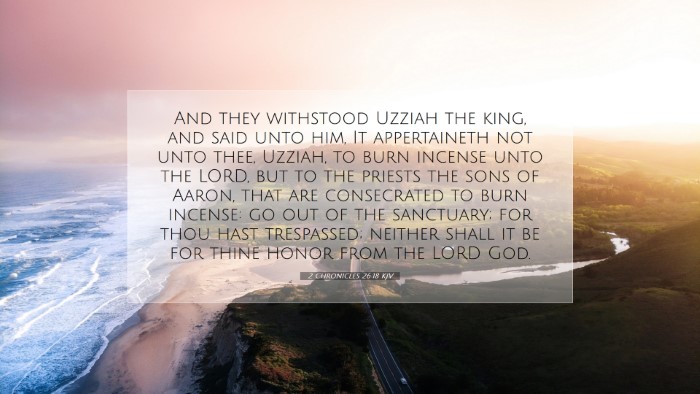Commentary on 2 Chronicles 26:18
Verse under consideration: "And they withstood Uzziah the king, and said unto him, It appertaineth not unto thee, Uzziah, to burn incense unto the Lord, but to the priests the sons of Aaron, that are consecrated to burn incense: go out of the sanctuary; for thou hast trespassed; neither shall it be for thine honour from the Lord God." (2 Chronicles 26:18)
Introduction
The account of King Uzziah (or Azariah) highlights significant themes regarding leadership, worship, and the proper order of God's house. His reign is marked by prosperity, military victories, and innovations but ultimately leads to his downfall due to pride. This verse in particular draws attention to the moment when Uzziah oversteps his bounds, attempting to perform the priestly duties that were not his and rebuked by the priests.
Contextual Analysis
Uzziah, having ascended the throne at a young age, initially reigns well, following the ways of his father Amaziah. The chronicler notes Uzziah's successes and the favor he received from God during his early reign (2 Chronicles 26:1-15). It is against this backdrop of his prosperity and growing pride that this confrontation occurs.
Role of the Priesthood
The priests, as representatives of the people before God, were the only ones appointed to burn incense (Exodus 30:7-8). Uzziah's actions represent a grave breach of God’s established order, an act of presumption in seeking to usurp a role designated for the priests alone. The assertion of the priests reflects the importance of adhering to divine instruction regarding worship.
Theological Insights
1. The Nature of Authority
- This incident highlights the necessity for leaders to recognize their God-appointed roles and the limits thereof. Uzziah's failure to comply demonstrates the dangers of spiritual arrogance.
- Pastors and church leaders are reminded of the importance of mutual accountability within the body of Christ, as prescribed in biblical teaching (Ephesians 4:11-13).
2. Consequences of Pride
- The warning against Uzziah serves as a sobering reminder of Proverbs 16:18, "Pride goes before destruction." His pride leads him to act outside the bounds of his authority, resulting in severe consequences.
- For theologians, this serves as a case study of how unchecked pride can lead even the most blessed leaders to a place of spiritual ruin.
3. Divine Order in Worship
- The fact that incense was only to be burned by the sons of Aaron underscores the importance of maintaining the divinely instituted order of worship. Uzziah’s intrusion disrupts this order, which God designed for the sake of holiness.
- This reflects upon contemporary worship practices and raises questions about adherence to biblical ordinances in church settings.
Commentary from Historical Perspectives
Matthew Henry emphasizes the need for respect for God’s ordinances and notes that Uzziah’s sin was a form of presumption. He notes, “It is a sin against God’s honor to assume that which belongs to a different order. If we take liberty in things God has restrained, we cannot expect His blessing.” Henry stresses the grave nature of Uzziah's sin, suggesting that such actions can provoke God’s wrath.
Albert Barnes approaches this passage with a focus on the nature of Uzziah's sin as a transgression symbolizing a willful disregard for God's designated structure of authority within the church. He observes, “If the king could take upon himself the sacred office, then the distinction of offices in the church would be lost. God is a God of order, and proper administration in worship signifies the recognition of His holy structure.”
Adam Clarke adds that Uzziah's pride led him to disregard the wise counsel of the priests, which serves as a lesson on the importance of heeding godly advice. Clarke writes, “Let kings and rulers be cautious how they engage in the service of God; they may have power, but not all power. Their authority does not extend to every service in the house of God.”
Application for Today
This passage serves as a critical reminder for leaders within the church today. The reality of spiritual authority and the limits of one’s position should compel leaders to remain humble and obedient. The role of the pastor or minister is one of stewardship and service, rather than domination or control.
- Pastors must be diligent to seek God’s guidance and remain cognizant of their roles within the broader ecclesiastical structure, recognizing the importance of collaboration with other church leaders.
- The contemporary church faces the challenge of maintaining worship that is reverent and aligned with biblical practices. This passage calls for careful theological reflection on how worship is conducted today.
- Church members are encouraged to support their leaders but also to hold them accountable, ensuring that the integrity of worship remains intact.
Conclusion
In summary, 2 Chronicles 26:18 is rich with lessons about authority, worship, and humility. It challenges pastors, students, and scholars alike to examine the dynamics of leadership within the church context and to advocate for adherence to God’s ordained order in all matters, particularly in worship. Uzziah’s tragic mistake serves as a witness to the importance of maintaining the sanctity of God’s holy institutions and the call for all leaders to act with reverence and humility before God.


